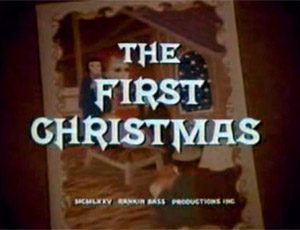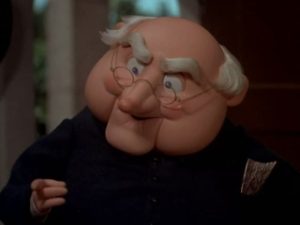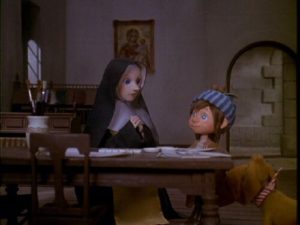
Hey gang! The second half of our Rankin-Bass marathon officially begins with a look at a lesser known title from the canon. From the minds that brought you Rudolph the Red-Nosed Reindeer and The Year Without a Santa Claus, comes a story about a simple boy stricken blind by lightning, and the loving nuns of the abbey who take him in. It’s The First Christmas: The Story of the First Christmas Snow!

The first thing you notice here is how much of a departure it is from previous specials. Many of the classic Rankin-Bass specials deal with larger than life characters that often feel mythical in scale. The First Christmas, by comparison, goes the opposite direction in every way. It’s a small story that feels genuine and real. It’s a jarring transition after the globetrotting adventure of The Year Without a Santa Claus, but fitting for the themes it chooses to cover. In a season of extravagance, The First Christmas chooses instead to deal in restraint and denial in order to heighten anticipation. I don’t like it.
The First Christmas is at the very least narrated by Angela Lansbury as Sister Theresa. This is a net positive in every way. Her calming, familiar tones lend such an air of credibility to this special that. Viewers today may know Lansbury best from Murder She Wrote and Beauty and the Beast, and in a way she’s everybody’s grandmother. Her performance here exudes kindness and charity and outshines pretty much everybody else involved.

We open the special on nuns painting Christmas cards, a seemingly new invention from Sister Theresa, created as a way to celebrate the holiday in lieu of presents. She grew up near the mountains, and is the only one in their village to have ever seen snow, so she draws it on all the cards. They talk about how the first Christmas was a snowfall, and other than the wild impossibility of that statement, something else is off in this scene and it has to do with the production itself. Two of the nuns are realistic, but the third is practically a little bouncing ball. It’s a bit of a hiccup in visual continuity and it feels like they may have reused some of their background character models in this one.
Suddenly, a great storm picks up with pouring rain and pounding thunder. Sister Theresa watches in horror as a shepherd boy is struck by lightning in front of her eyes. The nuns rush outside into the night of the storm, scattering their Christmas cards on the rain pounded ground in what is admittedly the best opening hook of any of these films so far.

The opening titles are jarring in tone. We see cast names appear on Theresa’s Christmas cards as they lay forgotten on the muddy ground, left to be soiled by the elements in almost a derision of their decadence, as the choir sings an overture of Save a Little Christmas For Christmas. Other opening sequences have used celebratory images, colourful spectacles to introduce their shows, but the haunting nature of the way The First Christmas introduces you to its cast feels tense and dramatic. This, if nothing else, is an excellent inversion of the format. The only fault here is that it feels out of line in opening a fun, festive special. Luckily, that’s not quite what we’re about to get.
The nuns find the boy unconscious and surrounded by ravenous wolves. After ensuring that he is, you know, alive, he’s brought back to the abbey along with his dog and sheep. At the abbey we learn his name is Lucas and that he’s blind, though little else is shared. We get less of a backstory on him than we even did on Aaron in The Little Drummer Boy. Not only blind, he’s an orphan with seemingly no connection to his past. His nature is that of a kind boy, however, thinking of his animals almost immediately, and that at least makes us warm to him fairly quickly. In an excellent bit of visual design, his blind eyes subtly resemble the Star of Bethlehem with their white outstretched lines on fields of blue.
Shortly after joining the sisters at the abbey, Lucas seems like one of the family. Even blinded, he continues to care for his animals. But when Father Thomas returns to the abbey, he decides that the proper place for an orphan is in an orphanage, and the boy will have to leave the only family he’s ever known after the Christmas holidays.

To bring their spirits back up, they start to put up decorations for Christmas. Again, Thomas seemingly plays, what I assumed at first was the bad guy, but the structure of the special sets him up as if he’s in the right. This priest wants them to take down all the decorations. Christmas should only ever be one day. No more. “Christmas was just a day, not all the time!” He literally takes candles off the tree and hands them back to the children! And here we find the strangest theme in any of our specials to date. It comes late in the game but makes absolute sense in retrospect. It’s not absurd, but seems to go a little far. A Charlie Brown Christmas rejected commercialization of the holiday. But no, that’s not good enough for The First Christmas. Father Thomas instead finds fault in keeping the season in our hearts at all. Christmas is a one time event and should be kept at arm’s length as long as possible in order to increase anticipation.
You know, I don’t even know why Lucas wants to stay at this abbey. When Sister Theresa introduces him to the kids at the village as a new member of their Christmas pageant, they all start to pick on him because he’s blind. They never let poor Lucas join in any reindeer games. He does have one friend in a girl named Louisa. She tells him a lovely story about putting hot potatoes in her hands to keep warm, and in exchange he tells her of his secret dreams.
Lucas dreams of snow. He’s literally dreaming of a White Christmas. Aha! Now I finally understand the inspiration behind the show. White Christmas is a song all about anticipation. Irving Berlin was initially strongly opposed to his song being included in a Rankin-Bass special, but since they had already optioned the rights from a publishing house for $250, our favourite stop-motion masters won out.

Where are they, by the way? Southern France? It definitely has that flavour to it where snow could be a rare but not unheard of occurrence.
Lucas realises he won’t be able to take his animals with him to the orphanage and decides to leave them with Sister Theresa as a gift. The other boys say “what a dumb idea” and lock all his sheep in a shed as a prank to make him think they’ve been stolen, but the animals actually do escape and run into the woods before Lucas arrives. Upon discovering this, Lucas runs off into the woods after her to save his sheep from the wolves we all saw during the storm.
At this point I was thinking: these wolves gonna eat this boy.
Unfortunately they don’t. That wouldn’t be Christmas, after all. The boys of the village help Lucas save his animals and get him back to the abbey in time for the show. During the performance, it begins to snow, and Lucas cries. The tears restore his sight and Lucas sees for the first time, and what he sees is snow! What a miracle.

I have complete apathy for The First Christmas. It deals in restraint and denial. It’s the opposite of A Christmas Carol. Rather than keeping it in your heart all year long, it wants you to savour and cherish it as a singular day. Lucas adores the snow so much because he’s seeing it for the first time. Even the running time, a tight 21 minutes, reeks of restraint. To enjoy Christmas for a full hour even seems too much.
The biggest sin The First Christmas has going against it is that it’s just so inconsequential. The films that have consistently been at the top of my ranks in this series had larger than life mythical characters that have also been non-religious in nature. While The First Christmas isn’t actually about the first Christmas in the way you might expect, it’s definitely more about teaching a “true” meaning of Christmas in the biblical sense. A sweet story that comes off as too heavy handed and soft to be genuinely entertaining, and doesn’t give me much to invest in other than Mrs. Potts’ voice.
- Rudolph the Red-Nosed Reindeer
- Frosty the Snowman
- Santa Claus is Comin’ to Town
- Twas the Night Before Christmas
- The Year Without a Santa Claus
- The Little Drummer Boy
- The First Christmas Snow
It seems to be Rankin-Bass at their creative lowpoint. So what kind of shot in the arm did the company need? How about a trilogy of sequels? 1976 would be a bumper year for Rankin-Bass, and we’ll start it off tomorrow with Frosty’s Winter Wonderland!


![[REVIEW] RETURN OF THE WIZARD KING](https://geekd-out.com/wp-content/uploads/2020/02/CAC5B1F8-9E0B-4BE8-AF06-A9591EDD859D-150x150.jpeg)
